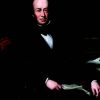John Rundle is memorialised in Adelaide’s busiest street, which fortuitously reflects his popularity as the MP for Tavistock, in Devon.
As one of the original directors of the South Australian Company, formed in 1835 with subscribed capital of £200,000, it was perfectly natural for Rundle’s name to be put forward by the Street Naming Committee for the city of Adelaide. Given that he was close to James Hurtle Fisher and John Brown, Rundle’s inclusion was almost assured from the outset.
Born to William and Mary Rundle in 1791 in the West Devon town of Tavistock, where his father was a banker, John had all the advantages of an upper middle-class childhood: a sound education, the expectation of a finely tuned social conscience, a strong grounding in business and commerce and a honed sense of how to behave in polite society. He was educated at Albion and sometime afterwards travelled to the continent where, like many others among the junior ranks of the aristocracy and most of the Philosophical Radicals, he took note of the continuing struggle in Europe for equality, liberty and fraternity.
His betrothal to Barbara Gill in 1825 ensured a strong family partnership in several flourishing industrial enterprises in Devon. Barbara was the daughter of John Gill, another successful industrialist in the county. In 1828 John and Barbara Rundle had a daughter, Elizabeth, and the young family settled to marital bliss.
Records show that in 1829 John Rundle joined the Society for the Diffusion of Useful Knowledge, led by Lord Brougham, the patron, and including other such well-known reformers. The Society provided a forum for their innovative and progressive educational ideas.
During the 1830s Rundle became synonymous with all that was successful in Tavistock. He held directorships in Gill, Rundle & Co. bank and the Gill & Rundle Foundry. The Rundle and Gill families had a large portfolio of other interests in the county and were also major shareholders in several mining companies in the area.
With the passage of the Reform Bill in 1832, Rundle was prevailed upon to run for office in the subsequent election and easily swept into the British House of Commons as the local member.
The electoral reform, which fulfilled the dream of dissenting radicals like Rundle, broadened electoral representation in the seat of Tavistock from 37 to 247 voters. Thereafter, it could no longer be described as a ‘rotten borough’, a derogatory term earlier ascribed to many constituencies in England’s south-west in which an MP could be elected despite very few voters.
The liberalisation of representation emanating from the Reform Bill meant that the Duke of Bedford, on whose patronage the township of Tavistock had depended for so long, set free one of the two parliamentary seats to which he was entitled. This is how Rundle was found a seat. As a result, his popularity in the town soared and he was unopposed in 1835, 1837 and 1841.
As magistrate for Tavistock, Rundle shouldered the resentment towards the crippling Corn Laws which so cruelly held bread prices artificially high in favour of the landowners. However, he refused to incite open rebellion, preferring instead to placate any hot heads with reassuring words from atop an upturned wheelbarrow.
He was a powerful and influential public speaker who could hold an audience in close attention. Not only did he push for economic expansion and industrialisation in the town, but also he demanded from such enterprises that some of the profits be reinvested in social capital for the community. He campaigned strongly on education, sanitation, health and public welfare issues.
Largely through Rundle’s efforts, Tavistock was lit by gas, provided with a decent water supply, an expanded town library, public baths and an adequate dispensary. Way ahead of his time, Rundle also proposed a sewerage system, although it was deemed to be unaffordable at the time.
The many family enterprises of Messrs Rundle and Gill centred strongly on the bank in Tavistock. The Rundle family provided employment for hundreds of people, so it was in an almost seamless transition of support from these people that John Rundle swept into the new Reform Parliament with a ready-made constituency. In the parliament he immediately aligned himself with George Grote and the other liberal radicals. They advocated the secret ballot, annual parliaments, the abolition of both slavery and transportation in all British principalities, the repeal of the Corn Laws, free trade and less abuse of the public purse by the established church.
Rundle became caught up in the euphoria of the five or six years the Philosophical Radicals had power and influence in the parliament, where they aligned themselves on most matters with the Whigs to bring on a raft of reformist legislative changes. This is how the South Australia Act gained passage in 1834.
He joined with scores of other inaugural members of the Reform Club of Pall Mall, became a proponent of Mechanics’ Institutes for local communities, and eventually Chairman of the Peace Society, which called for the abolition of war and violence everywhere.
Rundle’s constituency of Tavistock lay in the south-west region of Devon, not far from where George Fife Angas had moved in 1834 for the sake of his health. There is very little doubt that since Rundle and Angas were both in banking in the county, their paths would cross eventually. As a result, Rundle was given a seat on the board of the South Australian Company and Tavistock became a centre of recruitment for one of the special emigration agents set up by the South Australian Colonization Commission.
Rundle maintained a close connection with the South Australia project throughout his parliamentary career. In 1840 he joined the South Australian Society, in London. He was also to become a director of the first Bank of South Australia, obviously because of his relationship with Angas.
Rundle was apparently hovering backstage at the time of the colonial appointments to Adelaide in 1835 and he became agitated when Sir John Jeffcott (after being acquitted of a murder charge from a duel in 1834) was appointed the first Chief Judge in the colony. Rundle wrote to Sir George Grey at the Colonial Office protesting the appointment. He was obviously a man who set very high standards for himself and others and was known to be restless, even impatient.
The mutual interests and common moral, spiritual and economic activities which both Rundle and Angas seemed to share suggests their fortunes in life ran in parallel, at least for a time in the mid-1840s, when both were known to falter financially. Both were intense, shrewd businessmen and, like Rundle, Angas had high expectations of himself and others. Both were teetotallers and strong advocates for the temperance movement against alcohol consumption. Unfortunately, such discipline did not prevent either Rundle or Angas from financial setbacks.
The fledgling colony in Adelaide also fell into financial difficulties between 1840 and 1843. The foremost problem was that those who had invested capital were simply buying and selling land in a speculative manner (‘land jobbing’) without producing anything from it. It wasn’t until 1845 and later that the colonists began to reap the rewards of both mining and pastoral activities, allowing the colonial experiment to slowly improve.
It seems more than a coincidence that Rundle resigned from the parliament in 1843 amid speculation it was about his own financial or emotional turmoil, from which he would eventually deteriorate into a deep-seated depression. Being a man of high principles he could no longer serve honourably. Some of his activities which may have turned sour included the Tavistock Canal, which by then was suffering because of railway development, his investments in mining, or perhaps his new links with several railway companies which had become highly speculative, even in Adelaide. The Times reported his financial interest in both the Exeter, Plymouth and Devonport Railway and the London to Salisbury Exeter Plymouth Railway Co. (now The London and South Western Railway) as early as the mid-1830s.
By 1846 he purchased a directorship in the North Devon Railway for as much as £30,750. This proved to be disastrous. By 1851 his financial ruin was almost complete, for when asked to participate in yet another railroad project he declined strongly. There is no suggestion that the Rundle bank suffered in any way, but G. Woodcock speculates that it all became too much for Rundle’s apparently sensitive disposition and he began to withdraw from public life.
By 1854, with his life at a low ebb, Rundle moved in with his daughter Elizabeth and her husband Andrew, first in their house at Tavistock Square in London, and then in 1856 to Hampstead, to the couple’s other house. He died there on 4 January 1864 and is buried in Hampstead.
In 1856, the people of Tavistock honoured their local member of nine years with a portrait, which hangs today in the local guildhall. There is also a memorial to him in St Eustachius’ Parish Church in Tavistock.






Comments